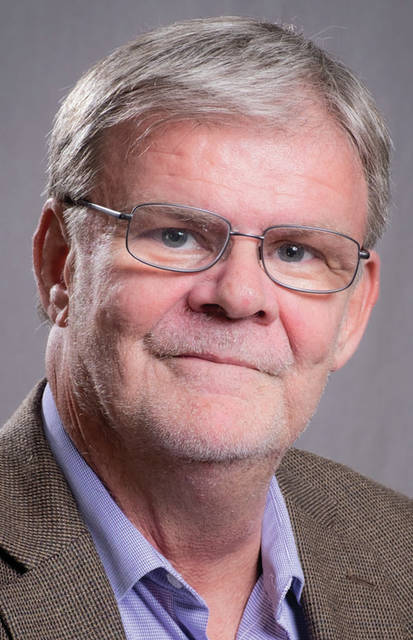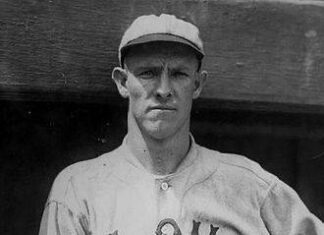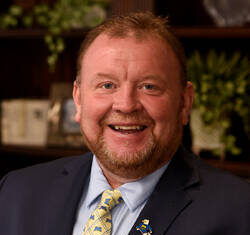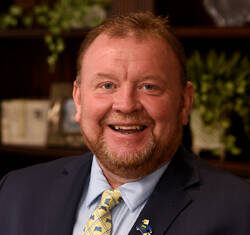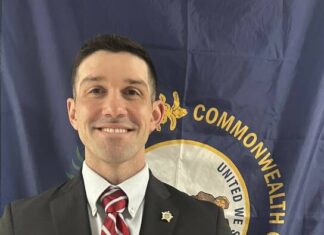Seventeen years ago this week, the president of the United States, George W. Bush, was in dire need of some props to use in a nationally televised speech.
A big speech. An important speech. Probably the most important one he delivered as president. A speech in which he tried to make the case for going to war with Iraq to the American people – many of whom were skeptical, to say the least.
He found the prop he needed in Cincinnati’s Art Deco masterpiece, Union Terminal, which has dominated the landscape in the West End since 1933.
And then, he found about 800 human props to fill the rotunda – props who were “specially invited” by the Hamilton County Republican Party, props who could be counted on to listen respectfully and applaud politely at the proper moments.
And finally, the Bush White House advance team – headed in those days by a Cincinnatian, Joe Hagin, the deputy chief of staff whose job it was to choreograph presidential visits – unfurled a huge map of the world behind the speaker’s platform, a not-so-subtle reminder to those viewing at home that the United States was the world power.
Perfect location, perfect props, perfect visuals.
But, you might ask, why here?
This was a speech that could have been made anywhere – the Oval Office, the East Room of the White House, anywhere the president chose to deliver it.
Instead, though, they brought the road show to Cincinnati.
Why? No mystery here: George W. Bush really likes Cincinnati.
It wasn’t the Reds or the Bengals or the cheese coneys and Montgomery Inn ribs that drew him over and over again to the Cincinnati area.
It was money. Good old-fashioned do-re-me.
There were very few places in this country where Bush – son of a president and the former Texas governor – could raise more campaign money than in Cincinnati.
The monied crowd – led by the late Carl H. Lindner, Jr. – was always there for his dad, George H.W. Bush, and George W. inherited them in his 2000 primary fight with John McCain.
McCain made an early fundraising foray into Cincinnati in 1999 and found that the checkbooks snapped shut when he came into the room – the big GOP donors had already maxed out with George W.
And Bush, as president, knew that the local GOP machine would turn out a friendly crowd.
Oh, there were Democrats there – they had to invite the Democratic mayor, Charlie Luken. There was a great photo in the Enquirer of Luken sitting with his hands folded across his chest. Seated on his left were then-U.S. Rep. Rob Portman and then U.S. Sen. Mike DeWine. On Luken’s right were Condoleezza Rice, who was Bush’s national security adviser at the time; and then-Ohio Gov. Bob Taft.
Of course, this was a major news event, one that drew all of the broadcast and cable news networks and nearly all of the members of the White House press corps.
The speech had been timed out for 29 minutes, so it would fit neatly into a half-hour time slot on national TV networks.
It came as the U.S. military was building up a force that would eventually invade Iraq.
In the speech, Bush’s principle argument was that Iraq’s dictator, Saddam Hussein, possessed and produced chemical and biological weapons and could be working on nuclear weapons.
The U.S. should not wait until it has “final proof” of Saddam’s development of such weapons.
“The smoking gun could come in the form of a mushroom cloud,” Bush said.
After eight years of war in Iraq – from March 2003 to December 2011 – no “weapons of mass destruction” were ever found.
I had covered many a Bush speech by then and this was the first time I heard him dispense with all the greetings to local officials and the stuff about how wonderful it was to be in Cincinnati. He just went straight into reading the speech off the teleprompters.
President Bush speaks at the Cincinnati Museum Center, Monday, Oct. 7, 2002. Bush, seeking support for war against Iraq, called Saddam Hussein a “murderous tyrant” and said he may be plotting to attack the United States with biological and chemical weapons.
What the national television audience did not see were the hundreds of protestors lined up on the street in front of the entrance to the Union Terminal parking lots. They were angry, they were loud, and they demanded to be heard. The local news media gave them plenty of ink and air time. The networks – not so much. They had to be in place on a riser to air the president’s speech and write in rows of press tables in the back of the rotunda.
That’s where I found myself eventually, after talking to protestors, with my laptop at the ready. I was to write the lead story for the Enquirer. Waiting and hoping that someone on the White House would drop off an advance copy of the speech – to be embargoed “until delivery.”
I waited and waited, but the advance copy never came.
It’s a useful tool for the reporter – you follow along with the speech as written and when the speaker veers off the script, you make notes of what he actually said.
It was even more important in this case.
The acoustics inside Union Terminal are not the best. Sounds rattles around in the rafters and bounces off the walls.
For print reporters – the scribblers like me who had no way to plug directly into the network audio feed – it meant that most of the speech sounded like the garbled talk of the grown-ups in a Peanuts cartoon.
I was able to snatch occasional lines, enough to cobble together a story that, for the most part, made sense.
Every once in a while, some junior White House press aide would wander by and cheerfully ask the local reporters, How we doing? Anybody need anything?
I was not in a good mood and got up in the grill of a couple of young press aides, barking at them like a mad dog.
What do I need? I need to hear this speech! I need a transcript!
I explained to them that I knew perfectly well that this was not being done in Cincinnati for the benefit of the local media. But I said that it was just plain rude to drag us down here for a presidential speech we can’t hear.
Where are the advances copies?
Finally, they admitted there weren’t any. That’s when I called it a Mickey Mouse operation and lost my mind.
Usually, I’m pretty calm and collected. But I was tired of being used by the White House.
I was assured my complaint would be passed on to the highest levels and that I would be hearing from the White House press office soon.
Despite my freaking out on the junior press aides, I managed to get the work done and had pretty much forgotten about the whole thing by the time I went to the Enquirer the next morning.
About midday, the phone rang. I recognized the number that popped up as being a White House line.
Hold for Mr. Fleischer, please.
I waited a minute and Ari Fleischer, the presidential press secretary came on the line.
I understand there was a problem in Cincinnati last night, he said.
I explained the whole thing to him.
I know this show was not put on for our benefit, but we were there, I said. I don’t like being treated like a prop.
No hesitation on the other end of the line.
I apologize, Fleischer said. Won’t happen again.
And the man was good as his word.
The moral of the story?
Don’t waste your breath on people who can’t fix it. Always go to the top.
Howard Wilkinson is 91.7 WVXU’s senior political analyst. His “Tales from the Trail” column appears on wvxu.org every Friday and gives a behind-the-scenes look at Wilkinson’s 45 years of covering the campaigns, personalities, scandals and business of politics on a local, state and national level.
